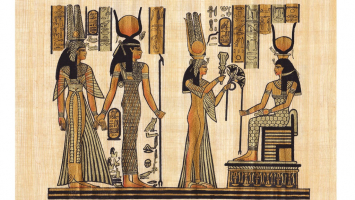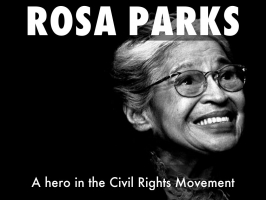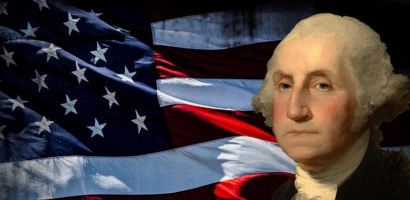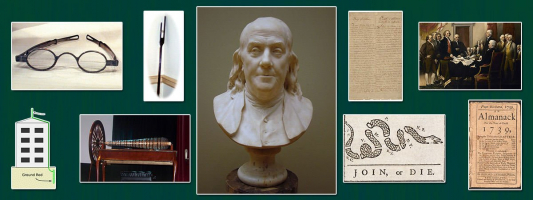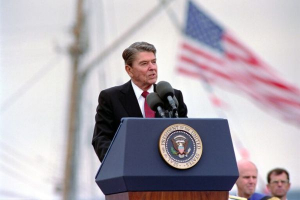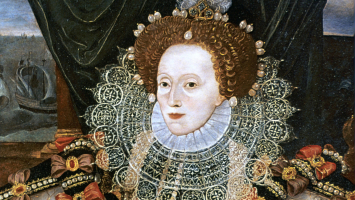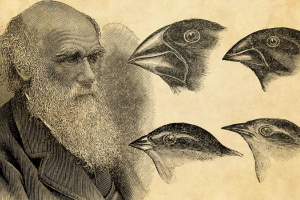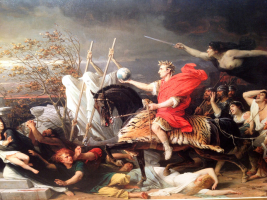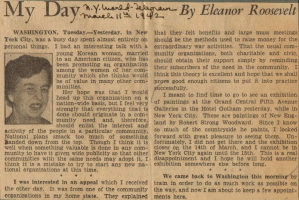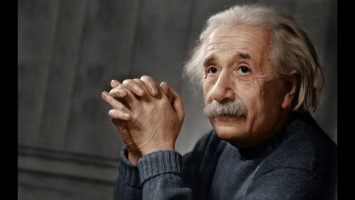Top 8 Accomplishments of Woodrow Wilson
Thomas Woodrow Wilson (December 28, 1856 – February 3, 1924) was an American politician and professor who served as the United States 28th President from 1913 ... read more...to 1921. He was a key architect of the League of Nations, and his progressive foreign policy attitude became known as Wilsonianism. Here are 8 key accomplishments of Woodrow Wilson you should know.
-
It is a fact that Woodrow Wilson became governor of New Jersey in 1910. By January 1910, Wilson had attracted the attention of New Jersey Democratic Party heavyweights James Smith Jr. and George Brinton McClellan Harvey as probable contenders in the forthcoming governor contest. After losing the previous five gubernatorial elections, New Jersey Democratic leaders opted to back Wilson, an unproven and unusual candidate. Party officials hoped that Wilson's scholarly credentials would make him a perfect advocate against trust and corruption, but they also hoped that his lack of government experience would make him easily swayed.
The leaders marshaled their forces at the state party convention and secured Wilson's nomination. On October 20, he presented his letter of resignation to Princeton. Wilson's campaign was built around his promise to be independent of party leaders. He rapidly abandoned his professorial demeanor in favor of more assertive speechmaking, presenting himself as a full-fledged progressive. Though Republican William Howard Taft won New Jersey by more than 82,000 votes in the 1908 presidential election, Wilson easily defeated Republican gubernatorial opponent Vivian M. Lewis by more than 65,000 votes. In the 1910 elections, Democrats also took control of the general assembly, however, the state senate remained in Republican hands. During his two years as governor, he defied the political establishment and implemented progressive changes such as a Direct Primary, safer working conditions, the suppression of political corruption, and the revival of the state public utility commission.
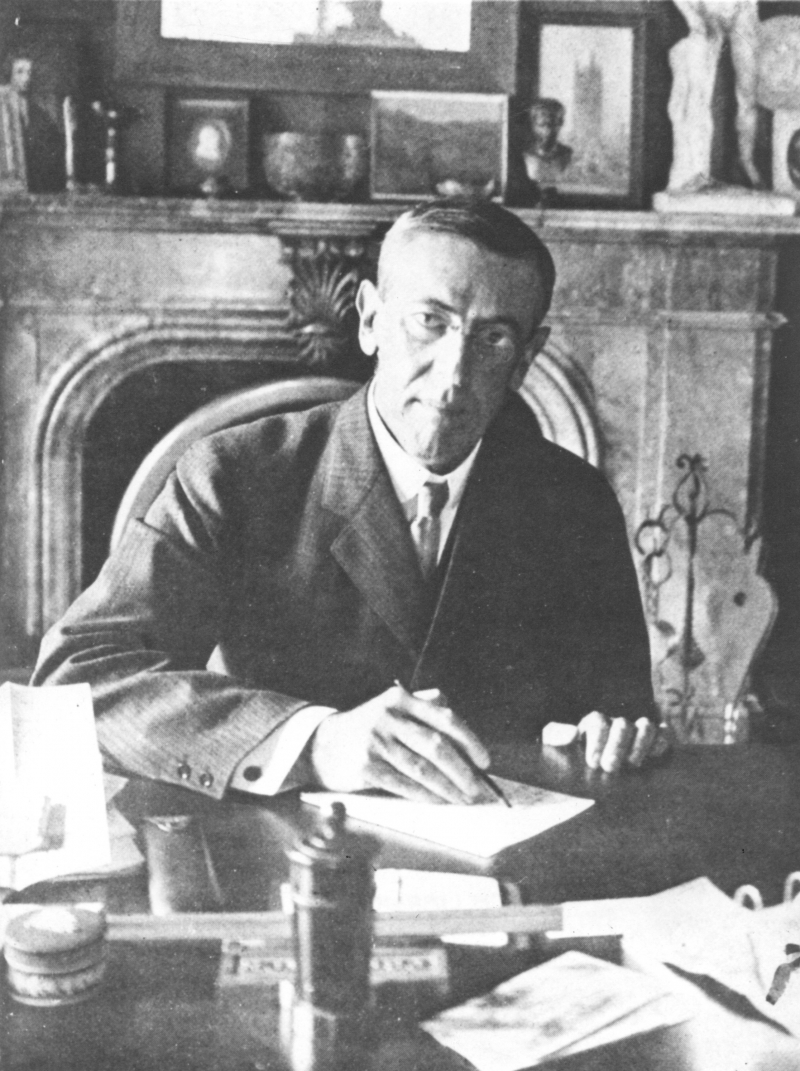
woodrowwilson.org 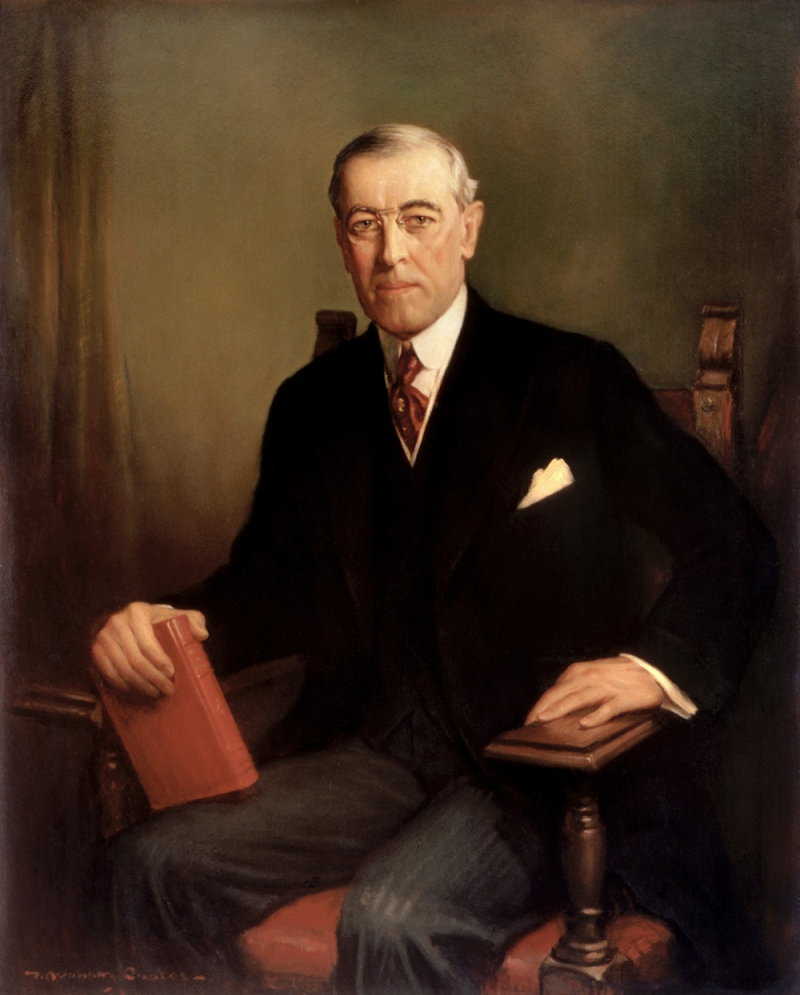
governors.rutgers.edu -
One of the most important accomplishments of Woodrow Wilson is that Woodrow Wilson served as the United States President from March 4, 1913, until March 4, 1921. Wilson, a Democrat who had previously served as governor of New Jersey, was elected president after winning the 1912 election with a huge majority of electoral votes and a 42% plurality of popular votes in a four-candidate field. Wilson was re-elected in 1916, narrowly defeating Republican rival Charles Evans Hughes. Wilson was a driving influence in the Progressive Movement, and during his first term, he supervised the approval of progressive legislative initiatives unprecedented until the 1930s New Deal.
In terms of race, Wilson's administration strengthened segregationist rules for government agencies. When World War I broke out in 1914, Wilson maintained a neutral posture while adopting a moralistic policy in dealing with Mexico's civil war. Wilson's second term was dominated by the United States' participation in World War I and its aftermath. When Germany started unrestricted submarine warfare in April 1917, Wilson pushed Congress to declare war in order to keep "the world safe for democracy." By the summer of 1918, conscription had dispatched 10,000 newly trained soldiers to France per day through the Selective Service Act.
Wilson raised income taxes, established the War Industries Board, encouraged labor union collaboration, regulated agriculture, and food production under the Lever Act, and nationalized the nation's railroad infrastructure on the home front. Wilson requested the Espionage Act of 1917 and the Sedition Act of 1918 in his 1915 State of the Union address, effectively repressing anti-draft protestors. Wilson went on a countrywide campaign to promote the pact, which would have incorporated the U.S. Wilson served the balance of his second term despite considerable concerns about his health and mental competence and unsuccessfully sought his party's candidacy for a third term.
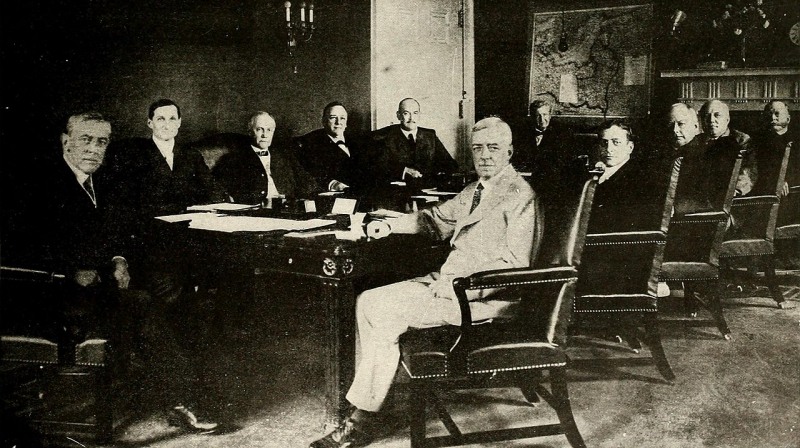
Woodrow Wilson and his cabinet - en.wikipedia.org 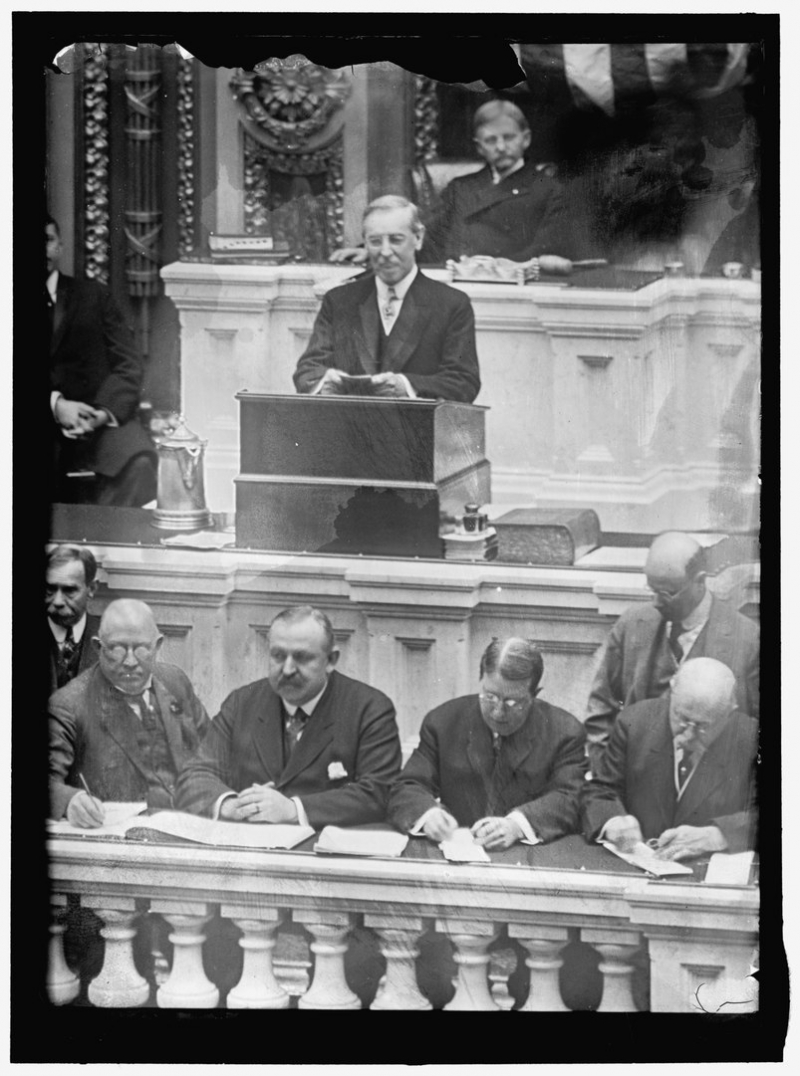
his first State of the Union address -en.wikipedia.or -
It is a fact that Wilson served as the president of Princeton University. Princeton trustees promoted Professor Wilson as president in June 1902, replacing Patton, whom the trustees regarded to be an ineffective administrator. Wilson established academic departments and a system of core requirements to stress the development of competence. Wilson launched an aggressive and successful fundraising campaign to fund these new programs, persuading alumni such as Moses Taylor Pyne and billionaires such as Andrew Carnegie to donate to the school.
Wilson appointed the first Jew and Roman Catholic to the faculty and helped free the board from traditional Presbyterian dominance. Wilson aimed to limit the influence of social elites at Princeton by abolishing upper-class eating clubs after reorganizing the school's curriculum and establishing the preceptorial system. Wilson's Quad Plan, which suggested relocating students to colleges known as quadrangles, was met with vehement opposition from Princeton alumni. Due to the severity of alumni criticism, the Board of Trustees directed Wilson to abandon the Quad Plan in October 1907.
Wilson clashed with Andrew Fleming West, dean of the graduate school, as well as ex-President Grover Cleveland, who was a trustee, late in his term. Wilson supported incorporating a proposed graduate school building into the campus center, whilst West preferred a more remote campus location. Princeton's board of trustees accepted a grant made to the graduate school campaign on the condition that the graduate school is placed off-campus in 1909. However, Wilson became dissatisfied with his employment as a result of the opposition to his proposals, and he began to consider running for politics.
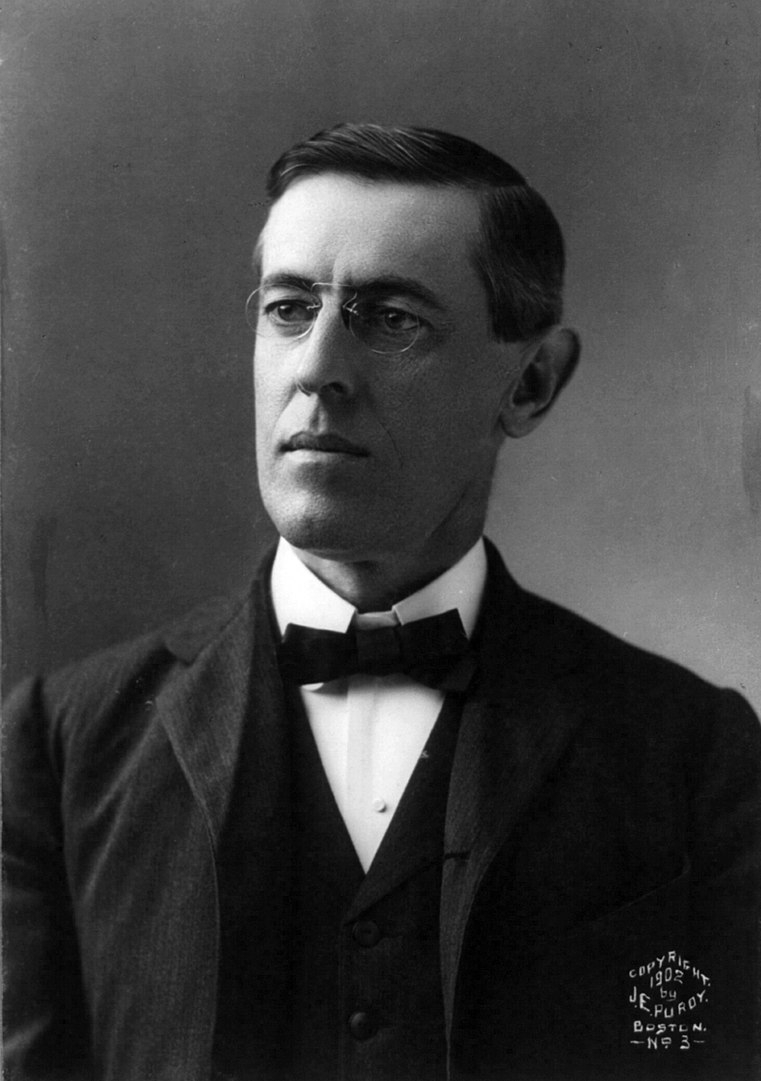
en.wikipedia.org 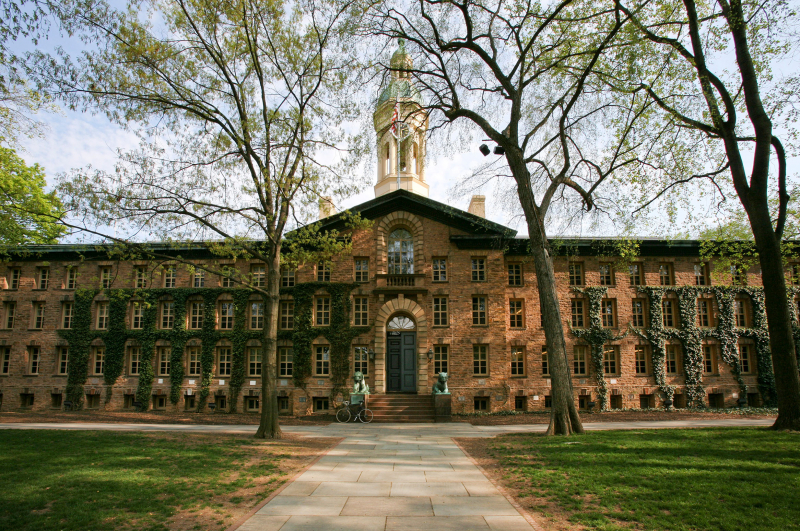
Princeton University -princeton.edu -
One of the most important accomplishments of Woodrow Wilson is that Woodrow Wilson established the Federal Reserve System. On December 23, 1913, President Woodrow Wilson signed the Federal Reserve Act into law after the 63rd United States Congress enacted it. The bill established the Federal Reserve Institution, the United States central banking system.
Following the Democrats' unified control of Congress and the presidency in the 1912 elections, President Wilson, Congressman Carter Glass, and Senator Robert Latham Owen drafted a central banking bill that straddled the Aldrich Plan, which advocated for private control of the central banking system, and progressives like William Jennings Bryan, who advocated for government control of the central banking system. Wilson made the bill a main priority of his New Freedom domestic agenda, and he played a key role in ensuring that it passed both chambers of Congress without major modifications.
The Federal Reserve Act established the Federal Reserve System, which consists of twelve regional Federal Reserve Banks that are jointly responsible for regulating the country's money supply, issuing loans and overseeing banks, and acting as a lender of last resort. The act established the Federal Reserve Board of Governors, whose members are appointed by the president, to lead the Federal Reserve System. The Federal Reserve Act was revised by the 1933 Banking Act to form the Federal Open Market Committee, which oversees the Federal Reserve's open market operations.
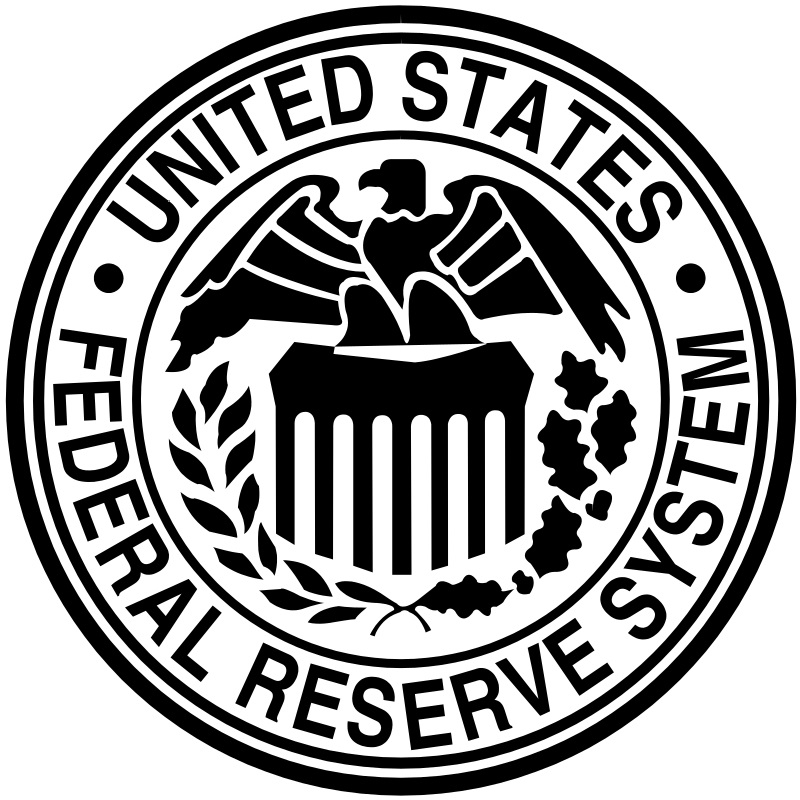
Seal of the United States Federal Reserve System -redbubble.com 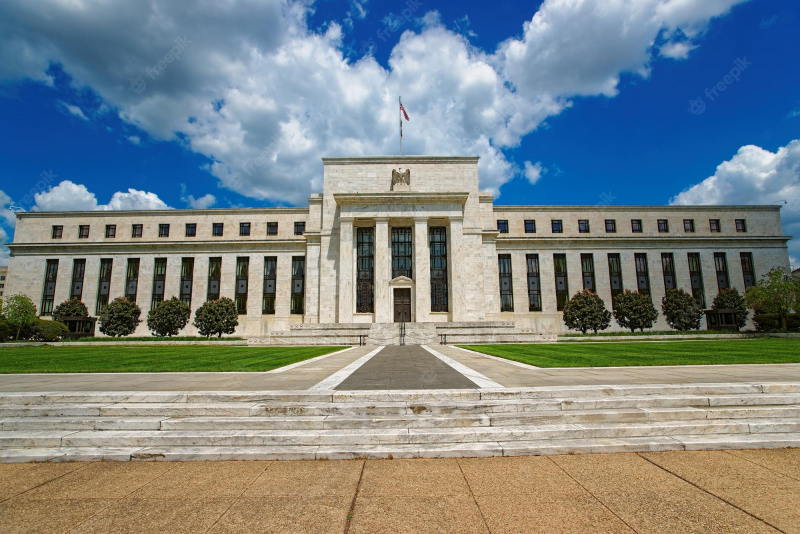
Federal Reserve Building -freepik.com -
The League of Nations was the first global intergovernmental organization whose primary goal was to keep the globe at peace. The Paris Peace Conference that ended World War I was established on January 10, 1920. The main organization was decommissioned on April 20, 1946, but many of its components were transferred to the new United Nations. The Covenant stated the League's key goals. They included collective security and disarmament to avert wars, as well as dialogue and arbitration to settle international problems. Other issues included work conditions, the treatment of indigenous peoples, human and drug trafficking, the arms trade, global health, prisoners of war, and the protection of European minorities.
The League of Nations Covenant was signed on June 28, 1919, as Part I of the Treaty of Versailles, and it went into force on January 10, 1920, together with the rest of the Treaty. The League's Council met for the first time on January 16, 1920, and the League's Assembly met for the first time on November 15, 1920. In 1919, US President Woodrow Wilson was awarded the Nobel Peace Prize for his role as the League of Nations' chief architect.
American President Woodrow Wilson directed Edward M. House to create a United States plan that incorporated Wilson's own idealistic beliefs as well as the work of the Phillimore Commission. The outcome of House's work, as well as Wilson's first draft, suggested the abolition of "unethical" state activities, such as espionage and dishonesty. Compulsion against obstinate powers would entail harsh measures such as blockading and closing the frontiers of that power to commerce or intercourse with any section of the world and using any force that may be necessary.
Despite Wilson's attempts to organize and promote the League, for which he was given the Nobel Peace Prize in October 1919, the League was never established. The League's first permanent home was the Palais Wilson on Geneva's western lakeside, named for Woodrow Wilson.
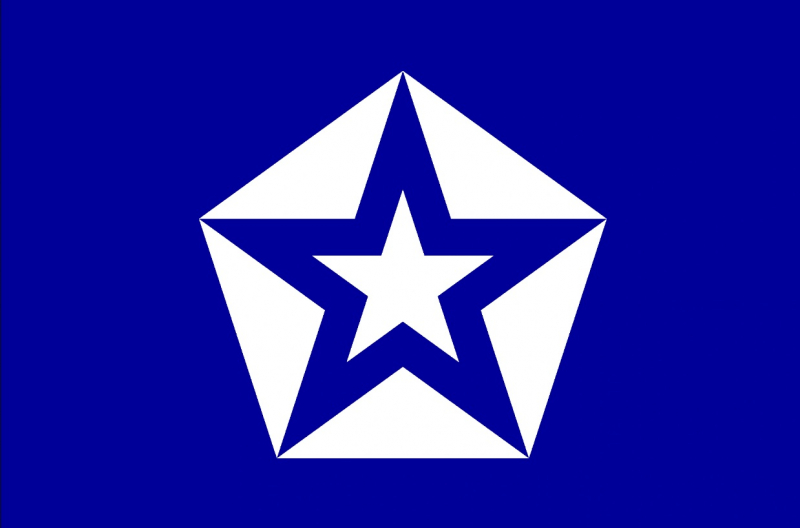
Flag of League of Nations -galitsia.fandom.com 
Woodrow Wilson's speeches -en.wikipedia.org -
Another important accomplishment of Woodrow Wilson is that he enacted two major laws: the Federal Trade Commission Act and the Clayton Antitrust Act. To foster economic competition and oppose extreme corporate control, he passed two significant laws: the Federal Trade Commission Act and the Clayton Antitrust Act. The Federal Trade Commission Act of 1914, in particular, was a United States federal statute that established the Federal Trade Commission. The Act, signed into law by US President Woodrow Wilson in 1914, prohibits unfair competition and unfair acts or practices affecting business. The Clayton Antitrust Act of 1914 is a piece of US antitrust law that aims to bring more substance to the US antitrust law system by preventing anticompetitive practices in their initial stages. The Clayton Act outlined specific banned conduct, a three-tiered enforcement mechanism, exemptions, and corrective actions.
Wilson came to support legislation that would create a new agency, the Federal Trade Commission (FTC), to investigate antitrust violations and enforce antitrust laws independently of the Justice Department as the difficulty of prohibiting all anti-competitive practices through legislation became clear. The Federal Trade Commission Act of 1914, which incorporated Wilson's ideas about the FTC, was passed by Congress with bipartisan support. Wilson signed the Clayton Antitrust Act of 1914 one month after signing the Federal Trade Commission Act of 1914, which expanded on the Sherman Act by specifying and prohibiting certain anti-competitive behaviors.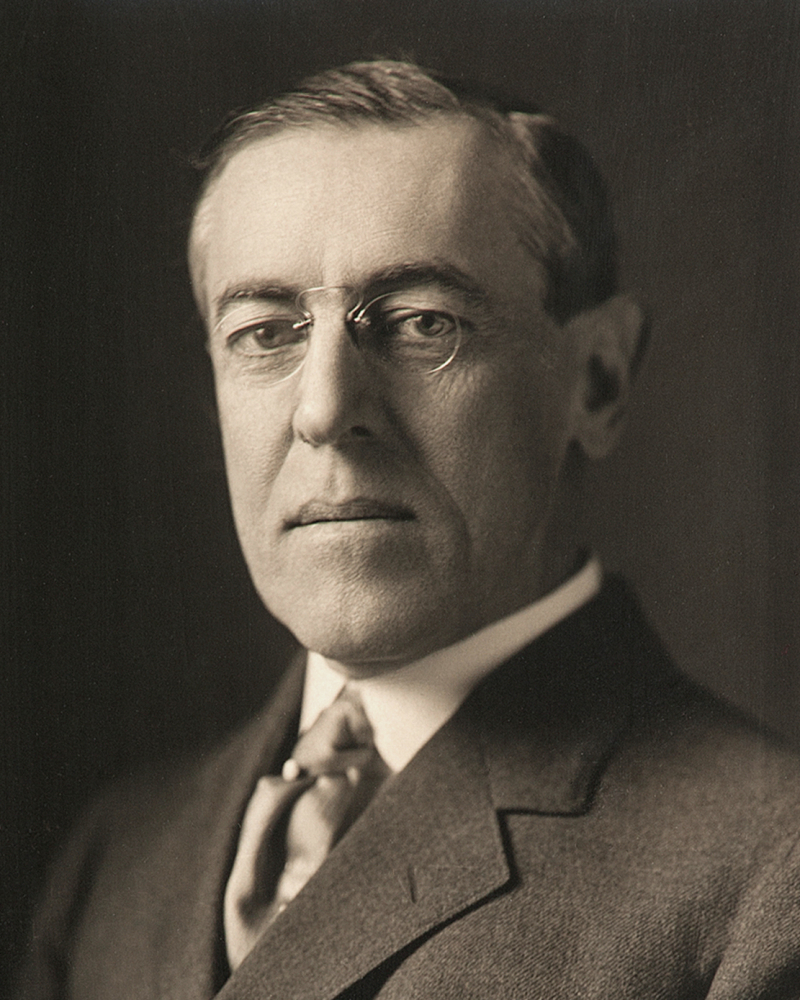
en.wikipedia.org 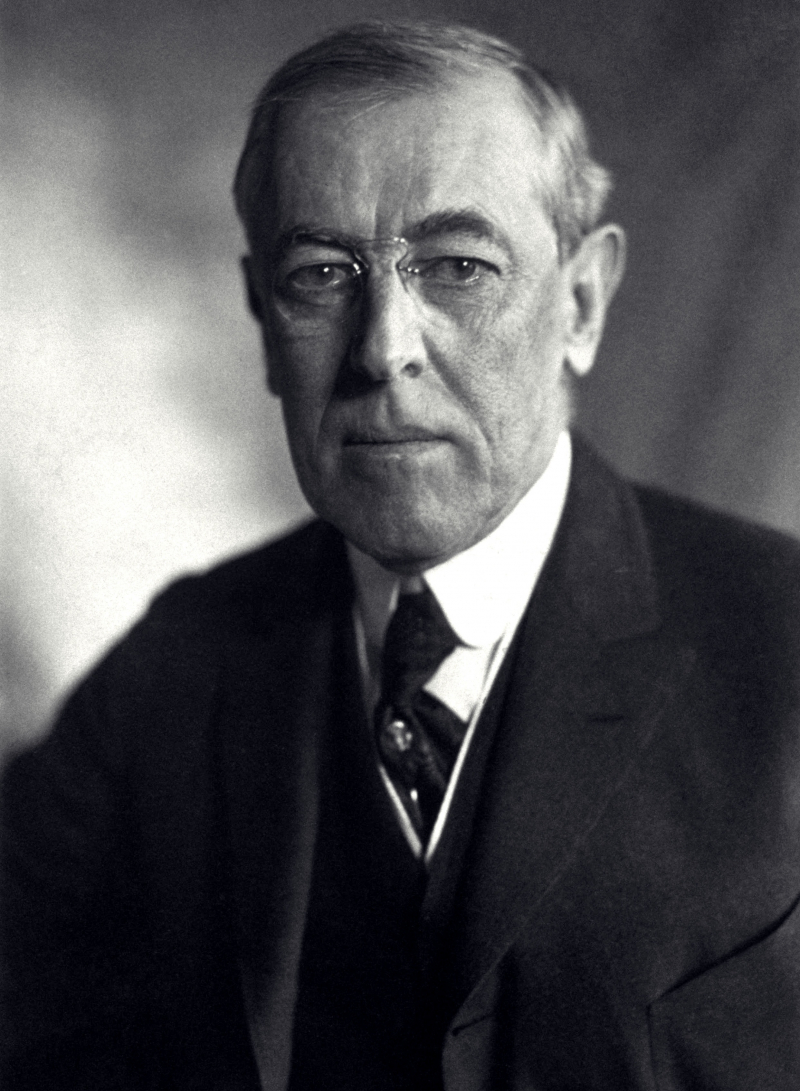
en.wikipedia.org -
One of the most important accomplishments of Woodrow Wilson is that he signed the Treaty of Versailles. The Treaty of Versailles was the most important of World War I's peace treaties. It brought the war between Germany and the Allied Powers to an end. It was signed on June 28, 1919, in the Palace of Versailles, exactly five years after Archduke Franz Ferdinand's assassination, which precipitated the war. The peace pact was signed after six months of Allied discussions at the Paris Peace Conference. The League of Nations Covenant was incorporated into the Treaty of Versailles, which concluded the war with Germany, as well as subsequent peace treaties.
In 1917, the United States declared war on the Central Powers, and President Woodrow Wilson mainly shaped the terms of the peace treaty. His war goal was to divorce the conflict from nationalistic disagreements and goals. Wilson issued the Fourteen Points on January 8, 1918. They outlined free trade, open agreements, and democratic strategy. Wilson had refused to include any major Republican in the Paris talks, and he had rejected a Republican compromise that would have permitted the Senate to adopt the Versailles Treaty and join the League of Nations.
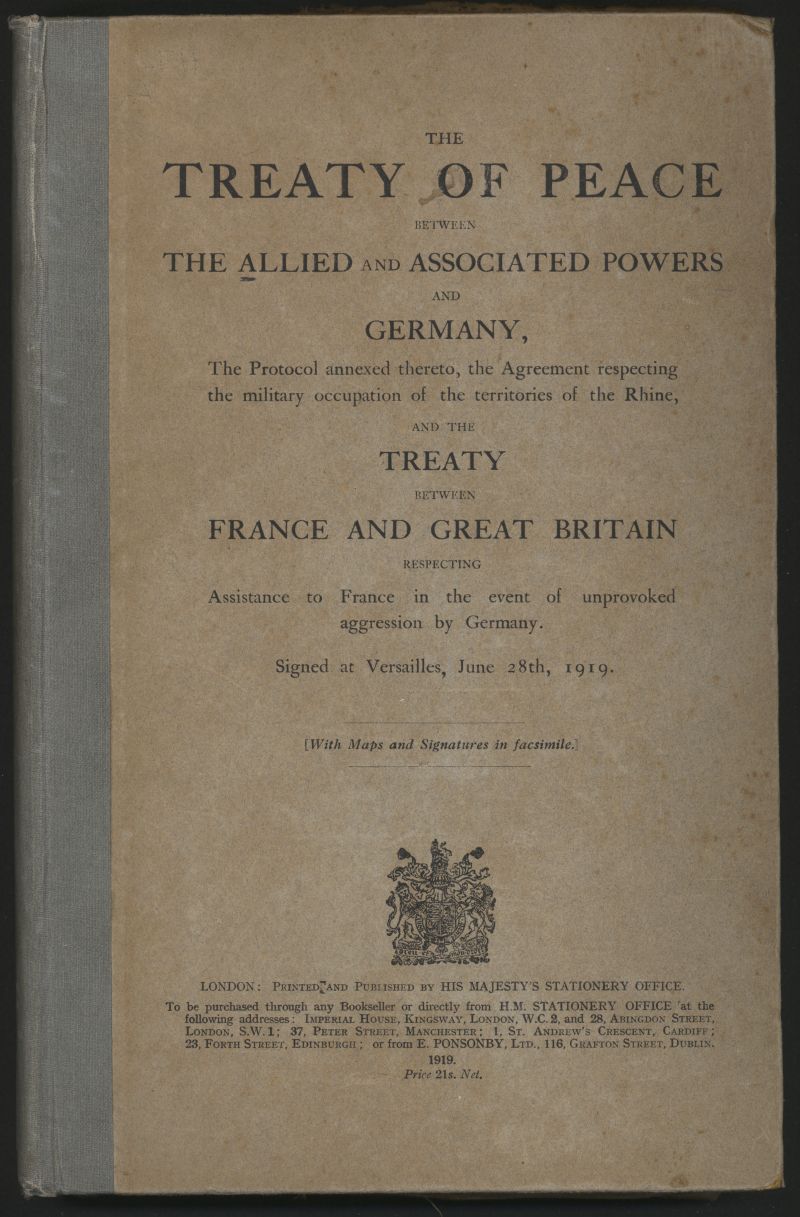
totallyhistory.com 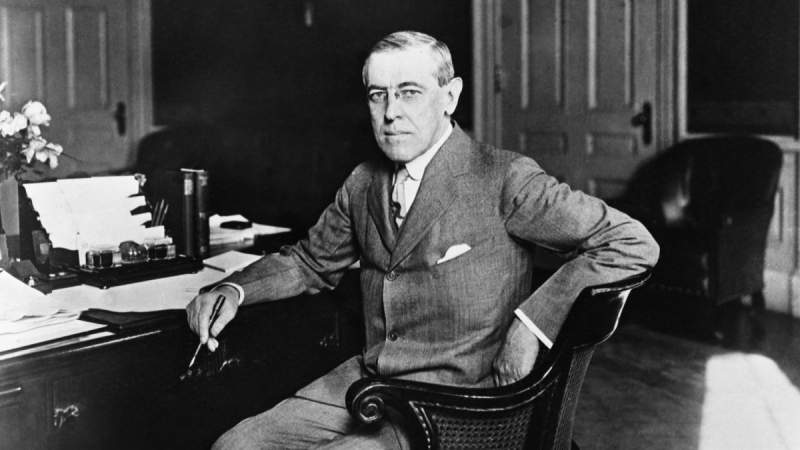
history.com -
Wilsonianism, or Wilson's idealistic foreign policy, left a long influence on American foreign policy, and Wilson's League of Nations impacted the establishment of the United Nations. Wilsonianism, often known as Wilsonian idealism, is a form of foreign policy advice. The word is derived from President Woodrow Wilson's thoughts and plans. In January 1918, he offered his famous Fourteen Points as a framework for ending International War I and achieving world peace. He was a strong proponent of the League of Nations as a means for the world community to prevent war and put an end to aggressive aggression. Wilsonianism is a school of thought within liberal internationalism.
According to some historians, Wilson did more than any of his predecessors to establish a strong federal government that would safeguard regular folks from the overwhelming influence of major companies. He is widely recognized as a pivotal player in the development of modern American liberalism, as well as a major influence on future presidents such as Franklin D. Roosevelt and Lyndon B. Johnson. Many of Wilson's achievements, including the Federal Reserve, the Federal Trade Commission, the graduated income tax, and labor legislation, continued to have an impact on the United States long after he died.
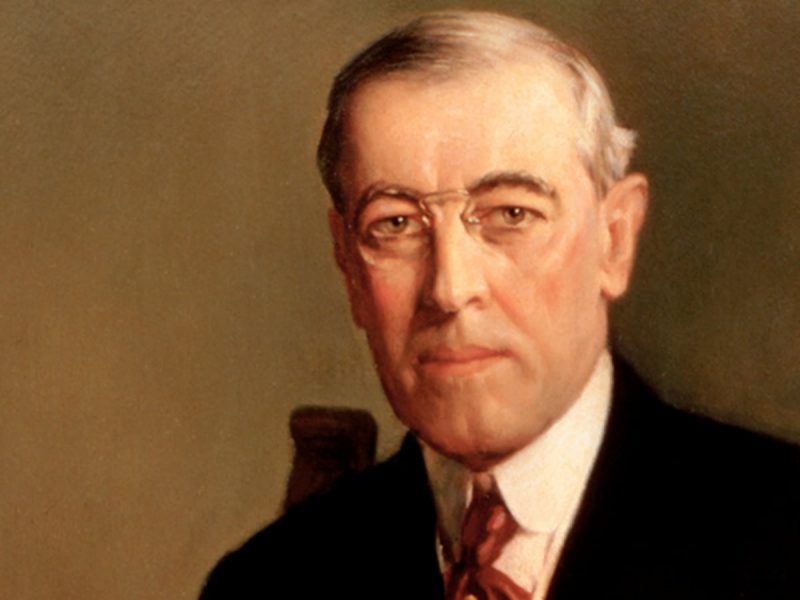
history.com 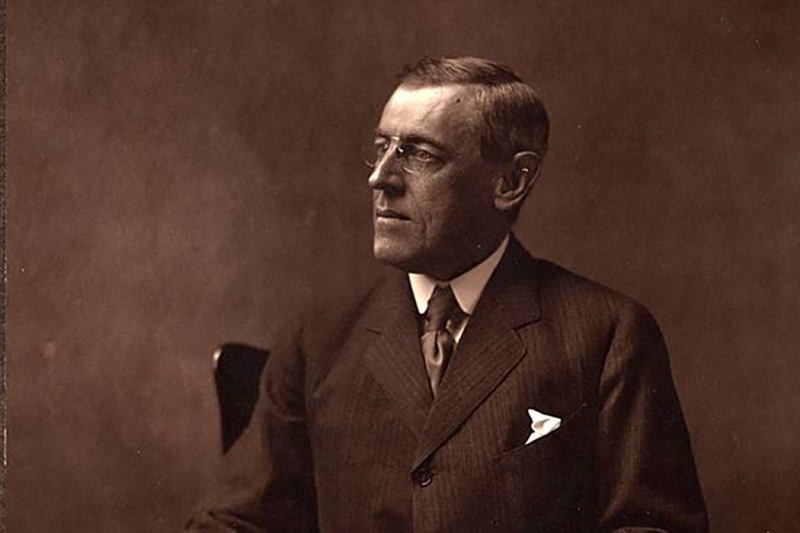
daily.jstor.org











